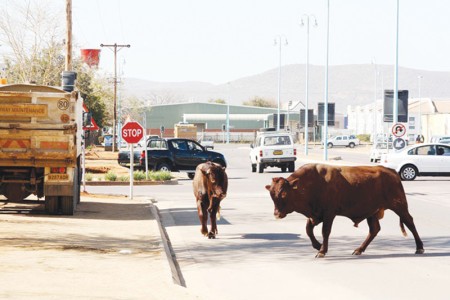Crafty farmers, 'cashless' cows raise stink in Phikwe
Onalenna Kelebeile | Friday April 13, 2018 13:18


SELEBI-PHIKWE: The Council is still unable to find a cure for its BCL Mine-sized migraine, two years after the operation’s unexpected closure.
The Mine’s fall, together with its plus 4,300 workers, meant a collapse in the overall economy of Phikwe, impacting on important Council revenue streams such as property rates, service levies, fees associated with advertising banners amongst others.
Adding to these troubles, the local authority is finding itself in an increasingly sticky situation.
The town has been overrun by stray livestock, ranging from cattle to donkeys to goats, as crafty farmers exploit a loophole in the Pounds Act that, for the past 10 years, has meant penalties of 25 thebe for cattle and ten thebe per day for other domestic animals.
At those rates, the communal farmers around Phikwe are actually herding their livestock into town where, if impounded, the animals will be fed, watered, given shelter and taken care of. By comparison, in the bush, farmers have to pay herdboys, fight to find pasture and water all while running the risk of attacks from wildlife and other dangers.
At the Council impound, all the farmers have to do is make sure they claim their livestock within the 21 days provided by law, after which the Council has the right to auction the animal and keep the proceeds.
Further sweetening the deal for the crafty farmers, the Council has to pay compensation if an impounded animal dies in its custody.
This state of affairs has led to an upsurge in stray livestock in and around Selebi-Phikwe town, leading to numerous road accidents and the associated threat of suits by motorists against the Council.
This week, the Council heard that in its last financial year, the local authority spent P100,000 on feeds, staff wages and other expenses associated with the impound lot, while only earning P13,000 in penalties for stray livestock.
This financial year, the budget for the livestock impound has gone up by close to 400% due to the influx of stray livestock. Initially, the Council expected to spend about P9,400 on the impound, but this is now expected to be more than P40,000.
The number could even be higher as the boundary fence around the town remains in tatters.
The financial stink raised by livestock in Selebi-Phikwe is yet another cause for concern for the town mayor, Molosiwa Molosiwa.
“Efforts to control livestock in the township are ineffective because the boundary fence is vandalised every time it is erected,” he told councillors this week. “We erect a boundary fence today and the next day it is cut and rolled away.
“Fencing the township boundary is not serving any purpose because farmers are vandalising the fence just to let their cattle into the township area.
“We try to round the livestock up but their numbers overpower our manpower.”
He continued: “The same cattle also cause a lot of destruction in the township area such as trampling on Water Utilities Corporation pipes in need of water. They also cause road accidents and this may attract lawsuits against Council by motorists who hit the roaming livestock”.
The Council is in a fix. It does not have funds to increase its patrols and it cannot keep repairing the boundary fence when farmers keep cutting it. Meanwhile, the livestock keep rolling into town.
The natural solution would be the local authority to significantly hike its penalties for stray livestock. However, that is not as easy as it would appear. The penalties have stayed the same for the past 10 years and it does not appear as though they will change anytime soon.
“A motion was once tabled in Council as councillors sought to review the charges, but it was decided that Council must review all charges across its various revenue sources. “This was however disturbed by the abrupt Mine closure. We will eventually review the charges but we will be cognisant of our local economic situation,” he said.
Meanwhile, the Council’s Finance and General Purposes Committee chairperson, Moses Serite told councillors that there would be no increase in abattoir revenues this financial year. In the last financial year, a lower number of animals were slaughtered, as the closure of the Mine weighed on the demand butcheries had for their produce.
Serite said there would also be no increase in the revenue Council earns from those who erect advertising signs around the town. “Many companies are closing down as they were related to BCL.”
Revenues from market rent have also declined as the stalls have been handed over to the ward development committees, while the Council does not anticipate increases in lease rentals as it does not expect to sign any new leases in the new financial year.
Similarly, revenues from waste collection are expected to remain flat in the new financial year. The only uptick in revenue, is expected in trade licence fees where the Council has noted that more people are applying for licences, since the closure of BCL Mine. The town council noted an eight percent jump in licence fees for the past financial year.
That good news, however, lies at the bottom of a pile of falling revenues, despondency and a steaming layer of cow dung.
The copper and nickel mining town has to learn to live without the copper and the nickel.
